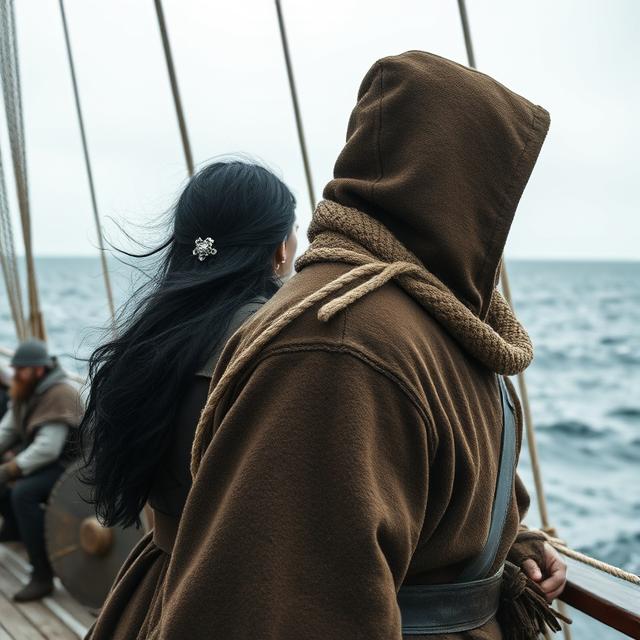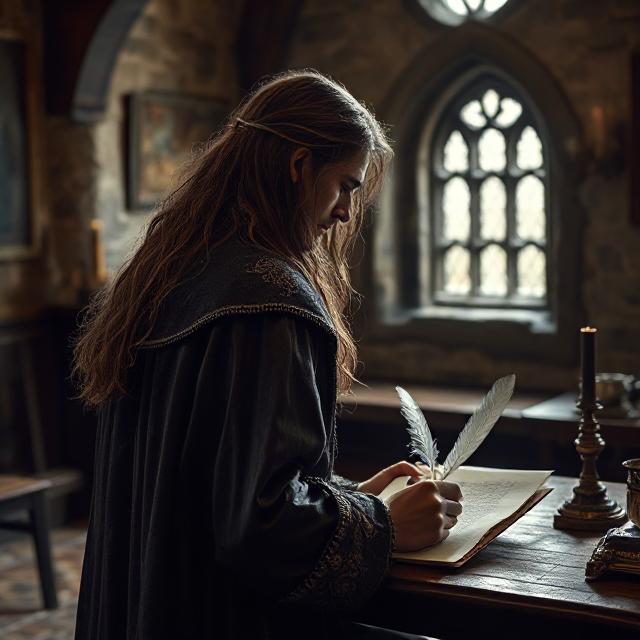The decision is made before dawn.
You stand at the window of your chamber in Aldebryn, the sea below still cloaked in mist. The gulls cry above the gray waves, restless and hungry. Behind you, Margaret stirs, her voice soft but steady.
“So it’s decided,” she says. “We go together.”
You turn to her. Her dark hair falls loose around her shoulders, her eyes lit not with fear but fierce resolve. “You could stay,” you tell her, though you already know her answer.
She shakes her head slowly, stepping closer. “Our lots are one now. Whatever comes to you, I will suffer it too. I will not wait behind marble walls while you ride to reclaim ghosts.”
And with that, there is no more argument.
Preparations move swiftly. The city of Aldebryn stirs with quiet purpose; coin changes hands in backrooms, letters sealed and dispatched under the cover of night. You gather a small retinue—trusted men from your household, a handful of Moravic exiles, and fifty seasoned mercenaries under the banner of the Silver Stag. They are soldiers of fortune, but their captain, a broad-shouldered woman named Seris Vann, gives her word that they will stand fast for pay and honor alike.
Margaret oversees the logistics herself. She moves through the docks like a queen, ensuring provisions, maps, and safe passage. To the townsfolk, it seems another trade expedition bound south; only a few know that beneath the holds of the flagship Vargyr lie weapons, armor, and the banners of your old house—folded, hidden, but ready.
When the tide turns and the ships set sail, Aldebryn fades behind you, its towers receding into the mist. You stand on deck beside Margaret, the wind whipping her hair across her face. She takes your hand and says nothing, but the pressure of her fingers says everything: forward, no turning back.
The voyage is long and uneasy. Storms lash the ships as you cross the northern seas, waves battering the hull until even the most seasoned sailors mutter prayers. Yet you endure. Each night, as lightning flashes across the water, Margaret stands beside you on the quarterdeck, her eyes reflecting the fury of the storm.

When at last you reach the southern shores—the outskirts of Moravice—the land greets you not with open arms, but with silence. The coastline is barren, the villages weary and suspicious. War has drained the people. You move inland under cover of night, through forests where the trees grow twisted from years of fire and neglect.
At first, your loyalists are cautious. Old faces emerge from hiding: men who once swore fealty to your father, women who smuggled supplies to your army during the rebellion. They come to you with hollow cheeks and hardened eyes, but when they see your seal, their voices tremble. “We thought you dead,” they whisper.
You tell them you are not. That you have returned to restore what was lost.
Word spreads quickly through the countryside. The farmers and smiths of the outer provinces rally to your cause, emboldened by rumor and memory. Within a month, you command several hundred men, ragged but eager, fighting under your revived banner—the black crow of Moravice. Margaret rides at your side, no longer merely your companion but your equal in command. Her sharp counsel tempers your pride; her presence steadies the troops.
The first skirmishes go well. You reclaim outposts, silence garrisons, and intercept supply routes. For a fleeting time, it feels as though destiny itself bends toward you.
But destiny is a fickle ally.
One morning, scouts bring word that Lord Ignacjusz’s forces have crossed the river. Not the broken remnant you once defeated—but a renewed army, bolstered by imperial reinforcements. Somehow, the Emperor—your Emperor—has shifted allegiance, or perhaps simply grown tired of waiting.
You realize, with a cold clarity that freezes the blood in your veins, that you have been outplayed.
Margaret sees the truth in your eyes before you speak it. “We cannot face them in the open,” she says. “We must retreat to the hills, rally again—”
But it is too late.
Ignacjusz’s cavalry strikes before dawn, cutting through your encampment like a blade through silk. Chaos erupts: tents collapse, horses scream, men scatter into the dark. You fight your way through the melee, sword slick with sweat and blood, Margaret beside you with a dagger in hand, refusing to flee without you.

At one point, the two of you stand back to back as the mercenaries form a desperate ring around you. The air is thick with smoke and the scent of iron. “We can still reach the eastern pass!” Seris Vann shouts. “Ride now or die here!”
You hesitate only a moment. You know the pass will not save your cause—but it may save Margaret.
You seize her hand. “We ride!”
Through the burning camp you go, dodging arrows and the dying cries of men who once called you lord. The sun rises red behind you as you gallop across the plain. The smoke of your defeat trails like a shroud.
By the time you reach the safety of the coastal cliffs, only a fraction of your company remains. The Silver Stag’s banner burns somewhere far behind. Ignacjusz’s army now holds Moravice.
And you—once prince, commander, would-be liberator—are once more an exile.
You return to Aldebryn not in triumph, but in silence.
The city receives you without fanfare. Whispers follow in your wake: the prince who tried and failed, the lord who left his kingdom behind twice. Yet there is no scorn in Margaret’s eyes, no bitterness. Only understanding.
You sell what remains of your fleet, pay the mercenaries their due, and buy a modest estate on the edge of Aldebryn’s outer hills—a quiet place overlooking the sea, hidden from political intrigues. There, you rebuild your life in smaller, quieter ways.
You take long walks along the cliffs, the wind fierce against your face, the waves below endless. Margaret joins you often, her arm looped through yours, her laughter carried away by the wind. Sometimes she says nothing at all, simply resting her head on your shoulder as you watch the horizon fade.
At night, you dream of Moravice: its broken gates, its rivers of fire, the faces of those who once believed. You dream, too, of the desert where it all began—where you lay half-dead beneath a burning sun, abandoned by comrades and faith alike, until Margaret found you. You remember her voice as she called your name, the cool touch of her hand on your brow.
That memory has never faded.
One evening, as twilight deepens over Aldebryn, you sit beside her by the fire. The years have softened the sharp edges of grief, though not erased them. The letter from the Emperor still lies in a chest upstairs, the seal cracked, the words long meaningless.
“I failed them,” you say quietly.
Margaret looks up from her embroidery, the firelight dancing in her eyes. “You lived,” she replies simply. “You loved. You built something again from nothing. That is not failure.”
You think of the road from the desert to the city, from exile to rebellion and back again. Of all that was lost—and all that endured.
The crow within your chest still stirs sometimes, but it no longer claws at you. Its wings are folded now, at peace.
You reach for Margaret’s hand, tracing the lines of her palm as if to reassure yourself that she is real. “We didn’t turn out the worst,” you murmur.
She smiles faintly. “No,” she says. “We turned out alive.”
Outside, the wind carries the scent of the sea, cold and clean. Somewhere far beyond the horizon, Moravice still stands, under banners not your own. But for the first time, you feel no bitterness. You have fought, lost, loved, and lived—and in the end, that is enough.
You draw Margaret closer, the fire crackling softly, and close your eyes to the world that might have been. The storm has passed. The desert, the war, the crown—they are all ghosts now.
Only her warmth remains. And in that, at last, you find peace.
The sea was calm that morning, a mirror of pale silver stretching to the horizon. Yet your heart was anything but calm. The rumors had begun weeks ago—whispers carried by traders from the south, by sailors half-drunk on ale and secrets: the Emperor had sent envoys north. Not merchants. Not allies. Men whose questions always ended with your name.
You had expected it, perhaps. The Emperor was not a man to leave loose ends, and your rebellion—though crushed—had reminded him that you still lived, that you still commanded loyalty in places he preferred silence. You had fled once before. You would not flee again.
Margaret found you at the edge of the cliff, the wind pulling at your cloak, your gaze fixed on the gray horizon. “You’ve heard,” she said softly.
You nodded. “The Emperor finishes what he starts. He will not rest until my death is another line in his ledgers.”
Her eyes, steady and bright, searched yours. “Then let him find not a frightened fugitive, but a man who no longer kneels.”
That night, by candlelight, you took up your pen. The parchment before you was thick and white, the seal of Aldebryn glinting red in the flame’s reflection. You wrote slowly, deliberately, the words heavy with finality.

To His Imperial Majesty,
Once, I was your servant. Once, I was your Duke. But I am neither now. I lay down my claim to Moravice, its titles, its lands, and its burdens. Let Lord Ignacjusz keep what he holds, and let the Empire’s historians record me as a man defeated, if they must. You will find no more soldiers rallying to my name, no banners raised in defiance. You have won, sire—if winning still matters to you.
I ask for no pardon, no reward, and no return. I claim instead what you cannot give and cannot take: peace. I will not live under your rule, nor against it. I will live beyond it. Should intrigue reach me here, I will answer it myself, without appeal or plea.
—Signed, once of Moravice, now of Aldebryn.
Then you wrote again, this time to every noble house still uncertain of where you stood:
Lords of Moravice and beyond,
Know that I renounce my title, my claim, and my feud. The blood spilled for my name must suffice for all debts. I ask no allegiance, seek no vengeance. Let this be the end of our wars.You sealed the letters with your own crest—the black crow, wings folded, no longer in flight—and sent for a courier.
Margaret found you again in the study, watching the wax cool on the desk. “It’s done, then,” she said.
“It’s done,” you replied. “Let them call me coward, exile, traitor. I will not wear their chains again.”
Margaret’s hand lingers on your wrist as you prepare the seal. “Sometimes silence speaks louder than defiance,” she says quietly. “If Claudius believes you’ve forgotten him, he may forget you in turn. A letter might remind him that you still breathe—and give him reason to finish what he began.” Her eyes search yours, steady and pleading. “Let the past rot in its own shadow. Do not stir it.”
……
You seal the envelopes and hand them to the courier, deciding that fear has ruled you long enough.
…….

One Comment